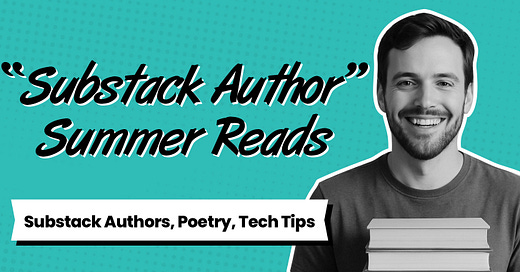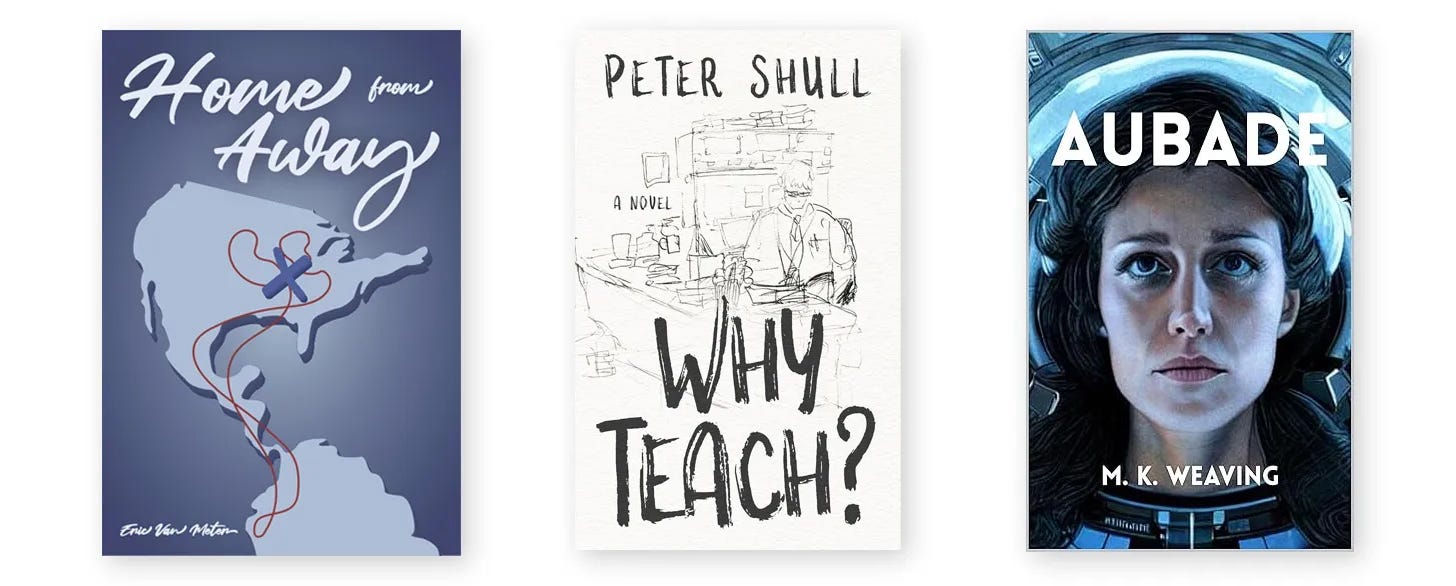"Substack Author" Summer Reads
Discover indie book picks from "Substack Authors", rediscover poetry, and a life changing tech tip.
Hey, Friends! I don’t usually write thematically, but when I do, I write about dos equis reading. Ok, that’s not true, but this week it is. This is my “summer reads” post. Let’s get into it!
Summer Reading
Summer is drawing ever closer. That means hot sunny days by the pool and a chance to catch up on some long overdue reading. In that spirit, I’d like to make three recommendations for books I am juggling reading at the same time—each independently published by creative Substack writers and available to read both on Substack and in book/Kindle form via Amazon.
If you buy from Amazon, consider supporting this publication by using my links below.
Home from Away
is the first in my list of recommendations. While the full book is out now, I’m actually reading it here on Substack as Meter serializes a new chapter each week. At the time of writing, Meter has released the first four. Home from Away is a coming-of-age story about Junius “Whit” Whitman and his complicated relationship with anxiety, his womanizing and devoutly religious father, and his own faith.Whit’s world of tung speakers and evangelicals is one I know almost nothing about, but Meter paints a vivid picture and deftly pulls from what feels like his lived experience. In an age where Netflix drops an entire season at once, I’ve enjoyed the anticipation of waiting for Meter to publish a new chapter each week.
Meter has also recorded his reading of the story, so listening to each chapter while on the go is an option.
Read it on Substack here.
Why Teach?
I’m only part of the way through Why Teach? by
, but I’m loving what I’m reading so far. Written by a fellow classroom teacher, Why Teach tells the story of William Able, a fourth-year stop-gap teacher, who, in the wake of the death of a favorite student, struggles to find his place in a school system that values test prep over deep learning.Having, in my own career, navigated similar themes (including returning to teach at my alma mater), the characters in this story resonate loudly with me. William Able is multi-dimensional. He ins’t Michelle Pfeiffer in Dangerous Minds or any other educational martyr often depicted in stories about school. Able is young, nuanced, and seemingly trying to balance his call to serve with his potential to earn richer rewards, “pursuing less-noble careers,” as Shull puts it.
Shull’s prose are sharp. His storytelling is vivid, and his characters richly depict the realities of working in education today. As summer break looms on the horizon, I’m excited to dive deeper into the world Shull has crafted.
Read it on Substack here.
Aubade
Aubade by M.K. Weaving (aka
on Substack) is a book I’ve only just cracked the first couple of pages of, but it’s high on my summer queue. About ten years ago, I fell down a science fiction rabbit hole. First it was Ender’s Game, then the rest of the Orson Scott Card canon, then a bunch of Mars books, and eventually Dune. Over the past year or so, I’ve read four in the Colony Mars Series by Gerald M. Kilby.The latter of the bunch tells the story of Dr. Jann Malbec and her harrowing tale of survival amidst the most dangerous thing of all on the Martian planet—humanity itself. From its description, Aubade centers around another strong female protagonist who unexpectedly finds herself forever ripped from her home, serving on an interstellar spacecraft as the crew’s historian. Why was she selected? Who selected her? Why does an interstellar spacecraft need a historian?
I have no idea, but I intend to find out soon, and you can too.
Read it on Substack here.
Takeaway: Support independent authors
The Next Great American Novel
Earlier this month, Peter C. Baker wrote a piece in the New Yorker titled Is the Next Great American Novel Being Published on Substack? It made its rounds on Substack’s Notes platform, getting amplified by Substack co-founder
and many others.The article centers around
’s novella Money Matters, published on Substack in October of 2024, and the article poses a really interesting question: will the next novel to achieve American great designation originate from a platform like this one, or will traditional publishing houses continue their long-held reign as gatekeepers to this prestigious title?Only time will tell, of course, but if the music industry offers any clues, breakout artists like Oliver Anthony and Chance the Rapper have proven it’s possible to build enormous followings, achieve critical acclaim, and earn financial success independently.
I, for one, am rooting for my Substack writing brethren and hoping their works break out and find massive audiences, especially those serializing their stories on the platform. With AI slop flooding the internet, there’s never been more noise to sift through online. At the same time, though, the potential audience that exists is far greater than even the Big Five publishing houses combined, so perhaps it’s just a matter of time.
Takeaway: There’s never been a better time to bet on yourself.
A Poet Who Didn’t Know It
I’ve never been one much for poetry, but my spidey senses are telling me that’s about to change. On a whim, I asked ChatGPT for some poetry recommendations, and that led me down a YouTube spiral. Ever since, I’ve been uncovering some amazing written words by poets now gone.
I thought it might be fun to share some of this new-to-me poetry, and then give a few thoughts afterward. Without further ado, here is the first in what might become a reocurring feature:
The Man Who Can
by Edgar A. Guest
Can't is the worst word that's written or spoken;
Doing more harm here than slander and lies;
On it is many a strong spirit broken,
And with it many a good purpose dies.
It springs from the lips of the thoughtless each morning
And robs us of courage we need through the day:
It rings in our ears like a timely-sent warning
And laughs when we falter and fall by the way.
Can't is the father of feeble endeavor,
The parent of terror and half-hearted work;
It weakens the efforts of artisans clever,
And makes of the toiler an indolent shirk.
It poisons the soul of the man with a vision,
It stifles in infancy many a plan;
It greets honest toiling with open derision
And mocks at the hopes and the dreams of a man.
Can't is a word none should speak without blushing;
To utter it should be a symbol of shame;
Ambition and courage it daily is crushing;
It blights a man's purpose and shortens his aim.
Despise it with all of your hatred of error;
Refuse it the lodgment it seeks in your brain;
Arm against it as a creature of terror,
And all that you dream of you some day shall gain.
Can't is the word that is foe to ambition,
An enemy ambushed to shatter your will;
Its prey is forever the man with a mission
And bows but to courage and patience and skill.
Hate it, with hatred that's deep and undying,
For once it is welcomed 'twill break any man;
Whatever the goal you are seeking, keep trying
And answer this demon by saying: "I can."Edgar A. Guest’s “The Man Who Can,” is straightforward and to the point, offering a clear warning about having a negative mindset. There’s little in the way of subtext, metaphor, or analogy. The first line lays out the entire thesis as clear as day:
“Can’t is the worst word that’s written or spoken.”
Hard to misinterpret that.
I really liked this poem. As someone new to poetry, it felt accessible. I didn’t feel like Guest was talking above my head. More importantly, I found the message inspiring without feeling too preachy. It was both a reminder of the weight words carry and a call to action to remove “can’t” from your lexicon.
“Hate it, with hatred that’s deep and undying,”
Hell yeah! I will.
Only in the second stanza did I find myself a little lost when Guest said, “and makes of the toiler an indolent shirk.” A toiler is clearly one who toils. Ok, not super common, but I get it. What about “indolent shirk,” though? I’d heard both words before, but honestly, I had to look up indolent. It means lazy. Got it. And shirk? I’d heard the word used as a verb, as in to avoid or neglect one’s responsibilities, but never as a noun. It turns out, as a noun, shirk means… a person who shirks.
Now I know.
In broadening my reflection, I guess this is kind of the point of poetry—to become better acquainted with the written and spoken word. This is not a task I will shirk (see what I did there?).
In my own writing, I examine the creative process. A theme that consistently comes up is doubt, fear, and procrastination. These notions are more often than not self-imposed demons, but Guest reminds us to reply to their whispers by saying, “I can.”
Takeaway: As a kid, I rejected the entire genre of poetry for reasons I can’t recall, but it turns out it’s actually pretty rad. It’s never too late to second-guess beliefs you hold to be true that are actually holding you back.
Windsor Greetings
If you didn’t know, I wrote a novella, and I’ve been publishing it here on Substack a chapter at a time every Tuesday. Well, it’s now also available as an audiobook on Spotify (technically it’s a podcast, but it’s just one episode and features me reading the story, so I’m calling it an audiobook).
At the time of writing, I’ve only recorded the first 6 chapters, but as I publish each new one, I will update the episode with the next.
You can listen to it here:
I tried to use AI services like ElevenLabs to convert my text to speech, and the technology is getting crazy good. The narrator voices sound way better than my nasal midwestern accent, but there are still enough errors that it wasn’t worth using. When the name Jan found itself at the end of a sentence, it would get pronounced January, odd pauses would be interjected periodically, and the vocal inflection of certain key lines was just plain wrong.
The tech is nearly there, but not quite.
Anyway, each chapter on Substack now also features my reading of the story, too. So have a read or a listen. Thanks for checking it out.
Takeaway: Publishing this story independently has given me creative freedom in both the telling of my story and its distribution.
Send to Kindle
This will be a short one, as the title is pretty much everything you need to know.
One of the lesser-known features built into Substack’s iOS app (and presumably Android) is the ability to send an article to Kindle. I love the feel of a book, but nothing beats the convenience of an e-reader.
My entire library in my pocket? Yes please.
The feature is pretty buried and may actually just be a feature of the operating system, but either way, I put together a quick visual guide to walk you through the process.
Read the article below:
Or watch this animated GIF:
Takeaway: You can read Substack articles on Kindle!
One More Thing
If you’re reading this on the Substack app, clicking the like and restack button goes a long way to helping surface this newsletter to other readers. It’d be super cool of you to click those buttons.
I’ll see you in your inbox again next week.
Until then,
-Mike









It's always great to support our fellow Substackers with their writing efforts, great shout. I read the first few chapters of Why Teach? on Substack and then hit the paywall, but it's on my TBR and I'll buy it one of these days (I have a whopping TBR and so many books to read). I'm going to check out Home and Away, that sounds intriguing.
There are a ton of Substackers who are serialising and have written books. Check out Stephen Duffy if you haven't already, he's up to chapter 17 with his latest, 'Fragile Steps,' and it's excellent.
If you're interested in a Victorian England Murder Mystery, Hanna Delaney has written 'The Spider', and it's sequel, 'The Ring' is out soon.
Lee Bacon is another great writer and a gentleman. My daughter is 7 and she loves his book 'Area 52' and we've just got the sequel. He has around 10 middle grade books out.
Re: sending to Kindle - I use Instapaper, it sends up to 10 articles at a time, it's super convenient if you like that option. I like having fewer files and there's a fun crapshoot element to reading totally different articles one after one another.
Thank you for the kind words about my sci-fi book, Aubade! It’s such a mood booster to see it gaining momentum with readers. I hope you enjoy reading it and that your readers will want to pick up a copy too.